A one-person protest in Beijing (above) has called for elections, an end to the country’s strict “zero covid” policy and the removal of “dictator” Xi Jinping, in a rare display of political dissent that was met with a wave of online censorship days ahead of a key political meeting expected to extend Xi’s rule for at least another five years, the Post reports.
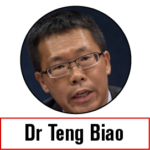
Credit: RFA
Teng Biao, a human rights lawyer and visiting professor at the University of Chicago, said the protest was significantly embarrassing for Xi, slipping through China’s surveillance apparatus ahead of the all-important party meeting, the FT reports.
“The protest echoes many Chinese people’s views. They are angry, especially with how Covid-19 has been dealt with, but everyone has been silenced. “This protest is a very important symbol of the anger and dissatisfaction of Chinese society,” Teng said. “That’s why the censorship went crazy.”
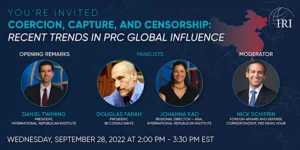 Less than two weeks after senior U.S. officials warned that Russia, China and other adversaries were set to launch a variety of influence operations and disinformation campaigns aimed at the upcoming midterm elections, researchers are finding traces of the malign efforts online, VOA adds. A report Thursday by the cybersecurity firm Recorded Future warned that Russia and China, in particular, have resurrected dormant social media accounts or have amplified ongoing influence operations to sway U.S. voters or sow chaos and discontent as Americans go to the polls. China is seeding social media with narratives denigrating the U.S. and with “political wedge issues related to the midterms,” it notes.
Less than two weeks after senior U.S. officials warned that Russia, China and other adversaries were set to launch a variety of influence operations and disinformation campaigns aimed at the upcoming midterm elections, researchers are finding traces of the malign efforts online, VOA adds. A report Thursday by the cybersecurity firm Recorded Future warned that Russia and China, in particular, have resurrected dormant social media accounts or have amplified ongoing influence operations to sway U.S. voters or sow chaos and discontent as Americans go to the polls. China is seeding social media with narratives denigrating the U.S. and with “political wedge issues related to the midterms,” it notes.
As China’s ruling Communist Party prepares to start its five-yearly congress beginning on October 16 – and with Xi Jinping set to complete his elevation to uncontested paramount leader – it is a fitting moment to consider the ways China’s global influence has evolved over Xi’s rule. It is also a good time to reflect on how the world’s democracies are responding to key aspects of the “China challenge,” notes Christopher Walker, vice-president for studies and analysis at the National Endowment for Democracy (NED).

National Endowment for Democracy (NED)
As part of a broader global authoritarian mobilization, China and other leading repressive powers during this time have targeted the minds and sought to alter the behaviors of foreign publics by manipulating key institutions in democracies, including universities, publishers, think tanks, policy institutes, media outlets, and entertainment companies, he writes for Democracy Paradox in a post is drawn from a longer essay, “Rising to the Sharp Power Challenge,” that appears in the October 2022 issue of the Journal of Democracy:
- Under Xi’s rule, Glenn Tiffert describes how the Chinese Communist Party (CCP) has pursued a “campaign to intensify ideological discipline at home… [and] is constricting not just the narrow space for expression within the PRC, but also its exercise abroad.”
- Nadege Rolland has spotlighted the intensification of the CCP’s use of “discourse power” to get others to do the CCP’s will, efforts that aim “to voice ideas, concepts, propositions, and claims that are respected and recognized by others and, in the process, to change, without violence or coercion, how others think and behave.”
Photos online purport to show a rare protest in Beijing’s Haidian district just ahead of the 20th Party Congress.
Extraordinary given pre-Congress security + surveillance
Among the slogans: ‘Don’t want PCR tests, want to eat’
‘Don’t want a Cultural revolution, want reforms’ pic.twitter.com/9RwyDb36RM
— Bill Birtles (@billbirtles) October 13, 2022
One day after Mr. Xi was first appointed party leader in November 2012, dozens of professors, lawyers and retired officials gathered in a Beijing hotel, urging China’s new government to take up political liberalization as a cure for corruption and abuses. “Democracy, rule of law, human rights and constitutional government are the unstoppable global tide,” their petition said, the Times reports. But political insiders quickly began to sense Mr. Xi’s hard-line direction, especially after scornful comments in late 2012 about former Soviet reformers.
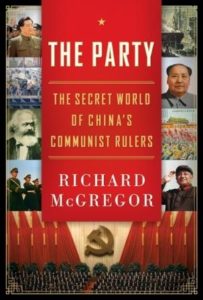 Xi also touted the “Chinese dream” of national rejuvenation, offering a tempting vision to restore China to its past glory and reclaim its rightful place in the world, CNN adds.
Xi also touted the “Chinese dream” of national rejuvenation, offering a tempting vision to restore China to its past glory and reclaim its rightful place in the world, CNN adds.
“Xi Jinping sits on top of the party, the party sits on top of China, and China sits on top of the world. That’s basically the program,” said Richard McGregor, a senior fellow at Australia’s Lowy Institute.
How China’s civil society collapsed
Another harbinger of regression that helps explain how China’s civil society collapsed was a 2013 internal Party communique that banned advocating what was described as Western liberal values, such as constitutional democracy and press freedom, AFP’s Laurie Chen reports.
“It treated these ideologies as hostile, whereas in the 1980s we could discuss them and publish books about them,” said Gao Yu, a Beijing-based independent journalist who was either in prison or under house arrest between 2014 and 2020 for allegedly leaking the document.
“In a normal society, intellectuals can question the government’s mistakes. Otherwise… isn’t this the same as in the Mao era?” he asked, referring to Communist China’s founder Mao Zedong.
China was described back in 2008, after the Sichuan earthquake, as being “on the threshold” of having a functioning civil society. Fast forward a decade, and a research paper penned by civil society researchers at Peking University describing the development of civil society as one of China’s greatest achievements, looks like a moldering historical document from a bygone era, Jia Ao reports for RFA Mandarin:
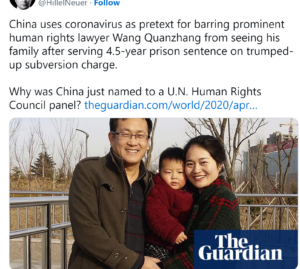 Human rights attorney Wang Quanzhang (right) said the Xi administration has largely nipped that development in the bud, because civil society is seen by the authorities as a thorn in their side. Wang said the government has gotten it wrong, because civil society groups ease social tensions and offer aid where the government doesn’t, contributing to social stability.
Human rights attorney Wang Quanzhang (right) said the Xi administration has largely nipped that development in the bud, because civil society is seen by the authorities as a thorn in their side. Wang said the government has gotten it wrong, because civil society groups ease social tensions and offer aid where the government doesn’t, contributing to social stability.
“If civil society cannot develop, then the rest of society will be less and less balanced, giving rise to continual and extreme cases of social conflict,” said Wang, who was released in 2020 after a four-and-a-half year jail term for subversion in connection with the public interest cases he was involved in.
“Chinese people have been oppressed by various organizations for a long time, throughout their history, without any independent civil entities to support them,” he said. “The stress on the individual can be enormous.”
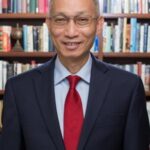
Minxin Pei
The history of strongman rule around the world, China included, reveals a worrying pattern, notes Claremont McKenna College professor Minxin Pei. Most long-lasting autocrats see stunning successes in their first decade in office, amassing power and implementing transformative agendas. Yet, as they extend their rule, they don’t only lose political momentum. Their sense of insecurity also grows dramatically, he writes for Bloomberg:
This combination encourages them to embark on more ambitious — and riskier — courses of action to regain momentum and safeguard their power. If they make the wrong bets, as is often the case, they bring disasters to their regimes and people. In the worst cases, such as Vladimir Putin’s invasion of Ukraine and Mao’s Cultural Revolution, strongmen double down on their mistakes in an effort to stay in power at any cost.
Since Xi Jinping became paramount leader in 2012, the CCP has reverted to a neo-Stalinist path, Pei argues. Such a strategy “will almost certainly exacerbate existing tensions, create new challenges, and undermine the CCP’s long-term survival prospects,” he wrote for the NED’s Journal of Democracy.
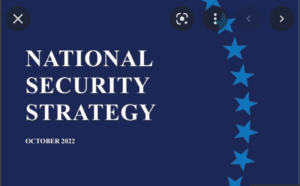 Rather than a “stark ideological framing” which risked alienating nondemocratic nations otherwise inclined to support Washington in tackling the challenges of authoritarian regimes like China, the Biden administration’s new National Security Strategy “keeps the democracy-versus-autocracy framing but tries for a more open approach, notes Christopher S. Chivvis, the director of the American Statecraft Program at the Carnegie Endowment.
Rather than a “stark ideological framing” which risked alienating nondemocratic nations otherwise inclined to support Washington in tackling the challenges of authoritarian regimes like China, the Biden administration’s new National Security Strategy “keeps the democracy-versus-autocracy framing but tries for a more open approach, notes Christopher S. Chivvis, the director of the American Statecraft Program at the Carnegie Endowment.
For one, it says the United States doesn’t believe it needs to turn autocracies into democracies in order to be secure. More important, rather than a global competition between all autocracies and all democracies, the White House now explicitly welcomes autocracies that reject using force to change borders into the tent.
“It is a struggle to square the circle between ideology and reality on these points,” Chivvis adds, “and the result is a somewhat awkward fudge that almost sounds as if the president and some of his advisers disagree about whether the democracy-autocracy competition is really so central.”
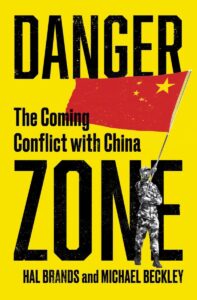 Underlying the resistance to change in China is the Chinese Communist Party (CCP). In a December 2021 piece for the Global Times, the Party’s English-language newspaper, reporters accused the U.S. government of backing “anti-China groups” to destabilize Chinese society through feminist rhetoric, Channing Lee writes for the Georgetown Security Studies Review.
Underlying the resistance to change in China is the Chinese Communist Party (CCP). In a December 2021 piece for the Global Times, the Party’s English-language newspaper, reporters accused the U.S. government of backing “anti-China groups” to destabilize Chinese society through feminist rhetoric, Channing Lee writes for the Georgetown Security Studies Review.
“[T]here’s growing evidence that some Western media outlets and anti-China forces have taken advantage of [the #MeToo movement] as a tool to incite gender antagonism and even divide and subvert rule of law in China,” the article reads, citing the National Endowment for Democracy (NED) and Ford Foundation as perpetrators.
Xi Jinping should beware, says @NEDemocracy board member & @JoDemocracy contributor @MPEI2014 @CMCnews: #China‘s leaders have made their worst mistakes in their second decades in power https://t.co/qvJI0FDpQH via @opinion
— Democracy Digest (@demdigest) October 14, 2022
#CCP‘s #GlobalTimes‘ paranoia – as hilarious as it is ridiculous – in its claim that @NEDemocracy & @FordFoundation exploit the #MeToo movement “as a tool to incite gender antagonism and even divide and subvert rule of law in China.” https://t.co/0f86tjx5yV via @gssreview
— Democracy Digest (@demdigest) October 14, 2022







